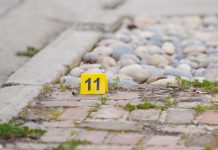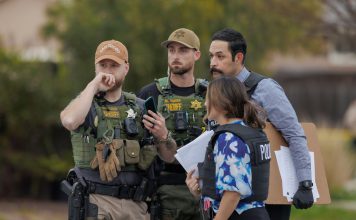GILROY
– The federal government will probably leave a flower grower
alone after raiding his San Martin farm on July 22 and seizing
19,000 opium poppy plants.
Daniel Campos swears he didn’t know that the poppy strain he was
growing was illegal, the kind which contains the raw ingredient for
opium, morphine and heroin.
GILROY – The federal government will probably leave a flower grower alone after raiding his San Martin farm on July 22 and seizing 19,000 opium poppy plants.
Daniel Campos swears he didn’t know that the poppy strain he was growing was illegal, the kind which contains the raw ingredient for opium, morphine and heroin. He was selling them as cut and dried flowers only, he said. They were one of the dozens of types of flowers he grows in San Martin and Watsonville.
The U.S. Drug Enforcement Administration hasn’t arrested Campos, and it is unlikely federal prosecutors will file charges against him, according to DEA spokesperson Richard Meyer in San Francisco. Matt Jacobs, at the U.S. Attorney’s office in San Francisco, confirmed that Campos has not yet been charged but would not comment on the likelihood of future charges or whether an investigation is under way.
There are about 120 poppy varieties, but only one is illegal to grow in the U.S. without a federal permit, according to Meyer. Campos’ flowers were that kind, the DEA determined.
Campos, who lives in Watsonville, was selling the poppies as cut and dried flowers at the time of the bust, and none of the pods had been cut to extract sap for drug-making, according to Meyer.
“I am against drugs 100 percent, believe me,” Campos said. “I hate drugs because they destroy everything.”
Campos has said the DEA needs to educate other flower growers about which poppies are legal, which ones aren’t and how to tell the difference. He figures he’s far from the only farmer growing illegal poppies out of ignorance.
“They have a lot of work to do to clean all the industries,” Campos said. “If you see the dried (flower) industry, there are poppies everywhere. … Even in bread, you see poppy seeds. … The seed (in bread, muffins and bagels), it looks exactly the same.”
Meyer said it is possible Campos is one of many flower farmers growing illegal opium poppies innocently, and he said his agency would look into whether and how the strain might have spread into traditional agriculture – although he noted that “It’s not our number one priority.”
To warn other growers about illegal poppies, Meyer said the DEA has been in touch with the California Cut Flower Commission, a growers’ guild based in Aromas.
Meanwhile, the Cut Flower Commission has stepped up to Campos’ defense.
“I’m sure he didn’t realize it and harvest it for any use other than as a cut flower,” said commission spokesperson Lee Murphy, who lives in Morgan Hill. “I certainly hope he isn’t (arrested).”
Other local farmers include poppies in their crops, Murphy said, but none rely on poppies because, while they add variety to a floral arrangement, they aren’t very popular on their own.
“There’s not a big demand for them,” Murphy said. “I don’t think they’re a real easy flower to ship. I think their stems are kind of flimsy.”
The only times customers have asked Murphy about poppies were while looking for flowers to match orange bridesmaid dresses, he said.
“I couldn’t have been asked about them more than three times in 15 years,” he said.
Other flower growers have had mixed reactions to the bust. Campos said one Watsonville farmer called him, upset, after hearing from a DEA agent about his poppies.
“He blamed me,” Campos said.
Campos said he has received only one phone call from the DEA since having his San Martin poppies seized and destroying his Watsonville crop himself. The agent asked for names of other poppy growers, but Campos said he didn’t feel right giving these and instead referred him to the Cut Flower Commission.
“It is not right for me to do (give out others’ names),” Campos said. “But I told him if I have to do it, I will do it.
I don’t want to be a troublemaker,” he added. “I just want to be done with this. … I am a quiet man. I just want to have my own life.”
Campos, who immigrated from Mexico 20 years ago, is a longtime flower grower and has been growing poppies for three years in Watsonville, but this was his first crop in San Martin.
Dan Tan, manager of South Pacific Orchids in Gilroy, said he got suspicious when he saw cut poppies for sale in San Francisco two weeks before seeing Campos’ bust on television. Tan said he asked the man selling them, who was a customer and a friend of his, why he was selling poppies, which he thought were illegal. The friend assured him they were OK.
Tan thinks these flowers were from Campos’ crop. He said the seller had bought them from the Morgan Hill area.
“I believe Daniel is the only one who grows them there,” Tan said.
Tan thinks Campos is innocent, however.
The San Martin seizure was the second poppy field bust in recent California history, according to the DEA. In June 2003, hikers reported 40,000 poppy plants being grown on federal land in the Sierra National Forest, near Yosemite National Park.
That was a clear example of a drug operation, Murphy said, commenting that Campos’ farm was clearly different.
“If somebody’s just growing poppies and a few marijuana plants, then you know what he’s doing, but our guys are growing 50 other varieties of flowers,” Murphy said.













